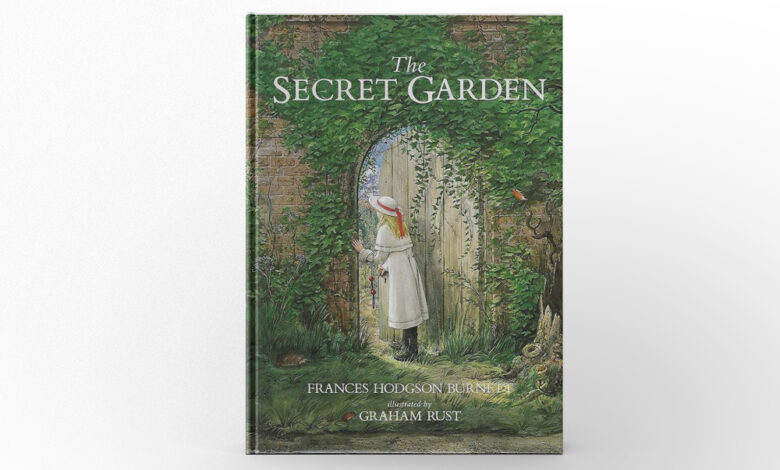The Secret Garden by Frances Hodgson Burnett
The Secret Garden: A Timeless Tale of Transformation and Healing

Frances Hodgson Burnett’s classic novel “The Secret Garden” is a timeless story that has captivated readers of all ages since its publication in 1911. This enchanting tale delves into themes of transformation, healing, and the profound impact of nature on the human spirit. “The Secret Garden” not only engages readers with its charming narrative but also offers a powerful message about personal growth and the beauty of nature. In this article, we will explore the novel in detail, focusing on its plot, themes, and enduring legacy.
Author’s Background
Frances Hodgson Burnett, an acclaimed British-American author, was born in 1849 in Manchester, England. Burnett’s literary career spanned several genres, including children’s literature, novels, and plays. She is best known for her children’s books, with “The Secret Garden” being one of her most celebrated works. Burnett’s writing often reflects her personal experiences and her deep empathy for children, which is evident in her vivid storytelling and her ability to capture the transformative power of nature. Her other notable works include “Little Lord Fauntleroy” and “A Little Princess.” Burnett’s contributions to children’s literature have left a lasting impact, and her stories continue to be cherished by new generations of readers.
In Depth Summary
“The Secret Garden” begins with the story of Mary Lennox, a young and spoiled girl who is orphaned and sent to live with her reclusive uncle, Archibald Craven, at Misselthwaite Manor in Yorkshire, England. Mary is initially a difficult and unpleasant child, having been raised in India by neglectful parents. Her arrival at Misselthwaite Manor marks the beginning of her journey toward personal growth and self-discovery.
At Misselthwaite Manor, Mary discovers a hidden, neglected garden that has been locked away for years. The garden, once vibrant and beautiful, is now overgrown and in a state of decay. Mary’s fascination with the garden leads her to secretly tend to it, nurturing it back to life. As she works on the garden, she begins to change emotionally and physically. Her character transforms from a sulky and spoiled child into a compassionate and resilient young girl.
Mary’s transformation is further supported by her friendships with other characters. She befriends Dickon, a local boy who has a deep connection with nature and helps her in her efforts to revive the garden. Through Dickon’s guidance and her own perseverance, Mary learns the values of hard work, patience, and empathy.
Another significant character is Colin Craven, Mary’s cousin, who has been bedridden due to a perceived spinal deformity. Colin is initially a bitter and withdrawn child, but his life changes dramatically as he learns about the secret garden and becomes involved in its restoration. Mary and Colin’s friendship is central to the story, and their bond grows stronger as they share their experiences and support each other’s growth.
As the garden flourishes, so do the characters. Colin’s health improves, and he gradually becomes more confident and joyful. The garden serves as a metaphor for the healing and transformation that occur in both the physical and emotional realms. The once-dying garden mirrors the characters’ journey from despair to hope, illustrating the profound impact of nature on the human soul.
The story culminates with the garden being fully restored to its former glory, symbolizing the characters’ renewed sense of purpose and happiness. The novel concludes on a hopeful note, emphasizing the power of nature to heal and transform lives.
Themes and Insights
“The Secret Garden” explores several key themes that resonate deeply with readers.
- Transformation and Healing: One of the central themes of the novel is the transformative power of nature. The garden symbolizes personal growth and healing, demonstrating how nurturing the natural world can lead to profound changes in one’s life. Mary’s physical and emotional transformation parallels the garden’s revival, illustrating how nature can rejuvenate the human spirit.
- The Power of Friendship: The relationships between the characters play a crucial role in the story. Mary’s friendships with Dickon and Colin provide emotional support and contribute to her personal growth. The novel highlights how meaningful connections with others can foster healing and positive change.
- Overcoming Neglect and Isolation: The characters in “The Secret Garden” grapple with neglect and isolation, both emotionally and physically. Mary’s transition from an ignored child to a nurturing caregiver reflects the novel’s exploration of how love and attention can counteract loneliness and emotional pain.
- The Importance of Curiosity and Perseverance: Mary’s curiosity and determination drive the plot of the novel. Her willingness to explore the hidden garden and her perseverance in restoring it underscore the value of curiosity and hard work in achieving personal goals.
Personal Reflections
Reading “The Secret Garden” is a deeply enriching experience. Frances Hodgson Burnett’s ability to create a magical, healing space within the story is both captivating and inspiring. The novel’s portrayal of nature as a source of renewal and transformation resonates with readers of all ages. Mary Lennox’s journey from a troubled child to a compassionate young girl is a powerful reminder of the potential for growth and change in all of us.
The depiction of the secret garden as a place of healing and discovery is particularly moving. The garden becomes a sanctuary for the characters, providing solace and rejuvenation. Burnett’s vivid descriptions of the garden’s revival and the characters’ emotional transformations create a sense of wonder and hope.
Recommendation
“The Secret Garden” is highly recommended for readers of all ages who appreciate classic literature with rich themes and compelling characters. The novel’s exploration of nature’s healing power and the importance of personal growth makes it a timeless and relevant read. It is particularly suitable for young readers and those interested in stories that highlight the transformative impact of nature and relationships.
Impact and Legacy
“The Secret Garden” has left a lasting legacy in the realm of children’s literature. Its themes of transformation, healing, and the power of nature continue to resonate with readers and inspire adaptations in various media, including films, stage productions, and television adaptations. The novel’s enduring popularity speaks to its universal appeal and the timeless nature of its message.
Frances Hodgson Burnett’s work has influenced generations of readers and writers, reinforcing the idea that literature can be a powerful tool for exploring and understanding the human condition. “The Secret Garden” remains a beloved classic, cherished for its ability to touch hearts and ignite imaginations.
Conclusion
Frances Hodgson Burnett’s “The Secret Garden” is a beautifully crafted novel that explores the transformative power of nature and the profound impact of personal relationships. Through its enchanting narrative and compelling themes, the book continues to inspire and uplift readers of all ages. The story of Mary Lennox and the secret garden serves as a reminder of the potential for growth and healing within us all, making it a timeless classic with a lasting impact.





